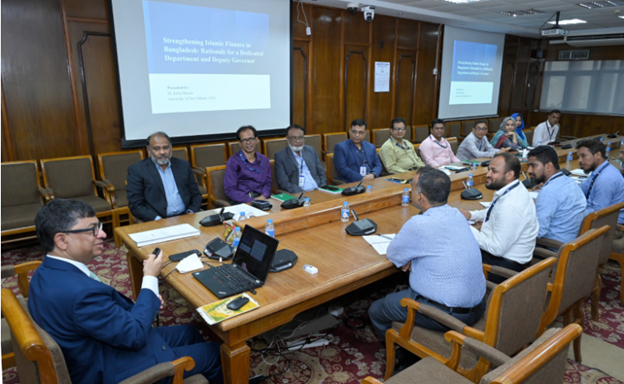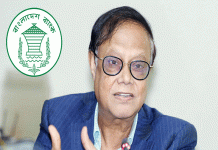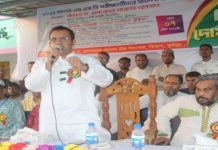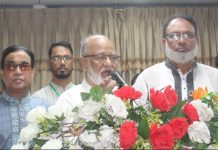
The Islamic Banking Regulation and Policy Department (IBRSPD) of Bangladesh Bank organized two significant seminars today at the central bank’s head office conference room. The events, titled “Governance Framework on Islamic Banking Division in Bangladesh Bank” and “Islamic Banking Financial Systems in Bangladesh: The Need for Education,” aimed to bolster the Islamic banking infrastructure and emphasize the critical role of academic knowledge in its sustainable development.
The seminars brought together high-profile academics, policymakers, and banking professionals. Renowned Islamic economist Professor Mohammad Kabir Hassan, currently a professor of Economics and Finance at the University of New Orleans, USA, delivered the keynote address. The sessions were presided over by Bangladesh Bank Deputy Governor Dr. Md. Kabir Ahmed, with welcoming remarks by Executive Director Md. Mezbaul Haque.
In his keynote, Professor Hassan emphasized the indispensable role of research in driving innovation and growth in Islamic finance. Drawing on global examples, he highlighted Malaysia’s success story, attributing much of its achievement to a strong focus on academic research and policy alignment. Professor Hassan urged Bangladesh to invest in knowledge development in Islamic finance, adopt international best practices, and formulate a comprehensive Islamic finance law to ensure consistency and accountability.
Among his key recommendations were the formation of a Central Shariah Board under the Bangladesh Bank, the appointment of a dedicated Deputy Governor to oversee Islamic banking operations, and initiatives to build human resource capacity in this specialized sector. He further called for addressing bureaucratic hurdles and ensuring that regulations are both efficient and inclusive.
Speaking at the event, Mohammad Abdul Mannan, a veteran banker and former Managing Director of Islami Bank Bangladesh and current Chairman of First Security Islami Bank, reflected on the steady growth of Islamic banking in the country. He noted that Islamic banking now holds a one-third share of the overall banking market and expressed confidence that this could rise to 50 percent with the right developmental initiatives. Emphasizing the necessity of education, he pointed out the pressing need to train 25,000 Islamic banking professionals and inform over 40 million customers about Islamic finance principles. Mannan strongly advocated for establishing a dedicated educational institute to meet this rising demand.
Executive Director Md. Mezbaul Haque reiterated Bangladesh Bank’s dedication to fostering a robust legal and regulatory framework for Islamic banking. He acknowledged the valuable insights shared by the speakers and stressed the importance of continuous dialogue and knowledge-sharing events to enhance the expertise of those engaged in Islamic finance operations.
A consensus emerged among the seminar speakers regarding the establishment of a specialized academic institution under the University of Dhaka, supported by Bangladesh Bank and the country’s Islamic banks. Such an institute, they said, would serve as a central hub for Islamic banking research, training, and policy development.
The seminars were well attended by senior officials from various departments of Bangladesh Bank, stakeholders from the Islamic banking industry, faculty members from Dhaka University’s Finance, Banking, Arabic, and Islamic Studies departments, as well as national policymakers.
The events marked a significant step forward in aligning Bangladesh’s Islamic banking sector with global standards, and laid out a clear roadmap for future growth rooted in education, research, and effective governance.







